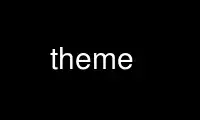
This is the command theme that can be run in the OnWorks free hosting provider using one of our multiple free online workstations such as Ubuntu Online, Fedora Online, Windows online emulator or MAC OS online emulator
PROGRAM:
NAME
theme — create a web page from a template file
SYNOPSIS
theme [-C option-flags] [-c options] [-d root] [-E] [-f] [-o file] [-p pagename]
[-t template] [-V] [textfile]
DESCRIPTION
The theme utility takes a markdown(7)-formatted textfile (or stdin if not specified,)
compiles it, and combines it with a template (page.theme by default) to produce a web page.
If a path to the template is not specified, theme looks for page.theme in the current
directory, then each parent directory up to the document root (set with -d or, if unset, the
root directory of the system.) If page.theme is found, theme copies it to the output,
looking for <?theme action?> html tags and processing the embedded action as appropriate.
theme processes the following actions:
author Prints the author name(s) from the mkd_doc_author(3) function.
body Prints the formatted markdown(7) input file.
date Prints the date returned by mkd_doc_date(3) or, if none, the date the input file
was last modified.
dir Prints the directory part of the pagename
include(file)
Prints the contents of file. Markdown(7) translation will NOT be done on this
file.
source The filename part of the pagename.
style Print any stylesheets (see mkd-extensions(7)) found in the input file.
title Print the title returned by mkd_doc_title(3), or, if that does not exist, the
source filename.
version Print the version of discount(7) that this copy of theme was compiled with.
If input is coming from a file and the output was not set with the -o option, writes the
output to file-sans-text.html (if) file has a .text suffix, that will be stripped off and
replaced with .html; otherwise a .html will be appended to the end of the filename.)
The options are as follows:
-d root Set the document root to root
-E Normally theme will not expand <?theme body?> or <?theme toc?> in the <head>
section, or <?theme style?> in the <body> section, but the -E option overrides this
and allows expansions everywhere.
-f Forcibly overwrite existing html files.
-o filename
Write the output to filename.
-p path Set the pagename to path.
-t filename
Use filename as the template file.
RETURN VALUES
The theme utility exits 0 on success, and >0 if an error occurs.
Use theme online using onworks.net services
